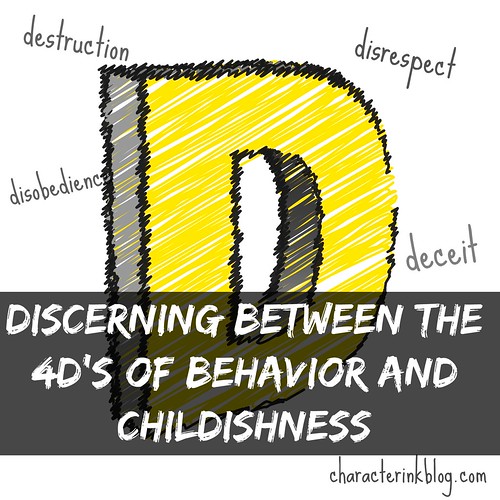One way that we like to help parents determine whether a child’s behavior is of a serious nature or whether it is simply childishness that needs training, rewards, more training, follow-through, and consequences to solve it is by using the benchmark of the 4D’s.
If you have been to our Raising Kids With Character parenting seminar, you have probably heard us describe the importance of determining which behavior a child is having. This is because the behaviors that we call the 4D’s are heart-oriented and more life-affecting than those that are simply childishness such as irresponsibility, laziness, or messiness.
That is, we take the four D’s behavior more seriously and attack it with more intentionality than we would childish behavior that we can train and teach from area
It will help you to be able to discern between the two types of behaviors if you recognize and memorize the 4D’s:
D-1: disobedience
This is willful behavior that is the opposite of what the child is told or is ignoring what the child is told. This is not to be confused with forgetfulness in early chore training or not understanding something he is told or not following through on “routine commands.” (He might need a morning routine chart or a “room, groom, dress, mess pie” to follow through on new skills and routines.) Willful disobedience means that the child knows and understands the instruction or the command but simply chooses not to follow it.
D-2: disrespect
Is also a willful behavior in which a child (or anybody) chooses to not show proper respect to an authority figure. Disrespect in a child usually begins in the home with disrespecting the parents. The reason this D is so important is not only because of the biblical admonition to respect parents but also because the other behaviors, that are the other 3-D’s will often not follow if this D is disregarded. Additionally, this D has a huge impact on the child’s success as an adult. The continuation of this D usually surfaces in school situations, with grandparents, leaders of clubs and organizations, etc.
D-3: deceit
Involves active lying, but also includes many other behaviors that stem from lying. Parents are often concerned about lying and stealing, but often overlook other “lesser” behaviors that are just as serious, such as not telling the whole truth, sneaking, and saying “I was just joking” to cover up you should not have said.
D-4: destruction
Destruction is an easy one to be confused with childishness. As a D, it does not include breaking things on accident, spilling things, dropping things, etc. Those things are childishness and we should teach toward those things or should I say away from those things smile… In this case, destruction is willfulness. It is breaking things or harming things on purpose. This is a heart behavior and should be carefully examined to be sure it is so before the child’s behavior is determined to be destruction.
I’m working on a podcast episode right now about what to do with the kindergarten student – that is, what should our focus be behavior wise as well as watching for readiness and when a child is ready to begin formal instruction. The four D’s are important to note in starting school. This is because they are so crucial to a child’s life-long submission and obedience to authority, honesty, and meanness, and they are heart behaviors that we should not overlook in an effort to move on academics.
To learn more about the four Ds of behavior versus character training and how to handle both types of behaviors well, check out our parenting seminar, Raising Kids With Character.




